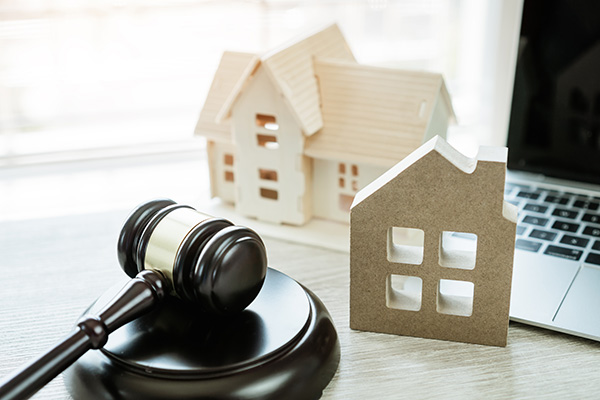You’ve worked hard to get where you are and to buy your home.
Day-to-day financial struggles can cascade into what can seem like an impossible situation.
Falling behind on payments can put you at risk of losing the very roof over your head.
But you have hope. A good Hawaii foreclosure attorney can help.
For example, with a Chapter 13 bankruptcy, you may be eligible to keep your home and even buy a new one in the future.
But you do need to act fast. Not filing the proper paperwork on time can mean it is too late to stop the foreclosure.
People may hear words like foreclosure or bankruptcy and picture someone losing their home and possessions.
Sometimes that does happen, but it isn’t the only possible ending to the story.
Blake Goodman, PC, Attorney is the largest bankruptcy firm in Hawaii.
Our team of Hawaii foreclosure lawyers includes Blake Goodman, who has helped over 8,000 individuals and families through situations like yours.
To get started, contact one of our foreclosure attorneys today.
Table of Contents
ToggleProtecting Our Clients Homes from Foreclosure

At Blake Goodman, PC, Attorney, we understand that your house is your castle.
We know you have worked hard to save up the money to put down at the time of purchase and have done everything you can to keep up with your mortgage payments for many years.
We also know that you have raised our kids in your house and wish to grow older there.
It can become an anxious time if you have unexpectedly missed a payment or two due to financial hardship.
That is why you should consider contacting a foreclosure attorney at our firm to discuss how to possibly avoid the embarrassment of foreclosure.
What Is Foreclosure?
A foreclosure is when a bank seeks to take back the collateral (e.g., a house) for a debt the borrower cannot pay. State and federal law govern foreclosures.
Whether federal law applies to the process depends on the property type and mortgage.
In Hawaii, foreclosures can occur in judicial or nonjudicial proceedings.
Judicial Foreclosure Proceedings
Judicial foreclosure proceedings are those that occur in the court system.
The lender first sends out the required notices of missed payments and informs the borrower that a foreclosure may occur.
Once a certain amount of time passes without the borrower making sufficient payments, the lender can file a foreclosure.
In the foreclosure proceeding, the lender ultimately seeks court permission to sell your home at a foreclosure sale.
Facing
Foreclosure?Your Foreclosure Defense Attorney
Facing the threat of foreclosure can be daunting, but you’re not alone. Turn to Blake Goodman, PC, your dedicated foreclosure defense attorney. With over 80 years of combined experience in Hawaii, we understand the complexities of foreclosure law and are committed to helping you protect your home and financial future. Our team will guide you through the process, communicate with lenders, review documents, represent you in court, and work tirelessly to explore all available options. Don’t let foreclosure overwhelm you; contact us today at (808) 556-7833 and take the first step toward securing your home.
Nonjudicial Foreclosure Proceedings
Nonjudicial foreclosure proceedings are those that occur outside of court. This kind of foreclosure happens without seeking court permission first and is typically completed quicker than judicial proceedings.
Like a judicial foreclosure, the lender must send out a certain number and type of notices before initiating the process.
In many cases, the lender can only engage in nonjudicial foreclosure proceedings if the mortgage contract has a “power of sale” provision.
The power of sale provision gives them the authority to conduct a foreclosure without going to court. Even so, they must follow the other terms of the contract and the law.
The Foreclosure Process Explained
If your mortgage company or home association decides to take action to collect, then they normally will send you scary letters first.
These letters will inform you of the debt and explain that if you don’t get caught up right away, they will initiate a foreclosure proceeding.
If you don’t make immediate payments after these written demands, it’s unlikely you will get a poster nailed to your door.
However, they will eventually come to your door in person and serve you with foreclosure documents.
Foreclosure means your creditors are trying to take your house away from you and obtain the court’s permission to sell it.
Usually, the Mortgage Company or AOAO serves you in person with a complaint in order to start the foreclosure lawsuit.
You can answer this complaint yourself, or you can hire an attorney to file and answer it for you.
Although this will buy time, unless you can pay the mortgage company what they want, you will lose the battle and your house.
After you get served with the complaint, various other hearings and orders will be entered against you.
This will lead to the posting of a sale date of your house at a public auction, where it will be sold to the highest bidder.
This means you will no longer own it and the new buyer will pay the mortgage off. I
f your house is sold at a foreclosure auction, whatever equity you had in the house will be completely lost, and you won’t see a dime of it.
How Bankruptcy Can Save Your Home

There is a solution to get caught up with your payments and keep your house: filing a Chapter 13 bankruptcy.
This chapter of the bankruptcy code was invented specifically to help defend against foreclosure lawsuits.
It allows homeowners the chance to re-organize their affairs and stay on their property. In the mid-1970s, Congress responded to the growing ranks of the homeless by enacting this quick and simple bankruptcy procedure.
It gave Federal bankruptcy courts the power to stop a foreclosure filed in any state court.
As a result of this legislation, you are given the chance to file a plan with the bankruptcy court that will allow you to repay your mortgage company or AOAO.
In fact, it can be used to repay all of your creditors. The plan is over a maximum of 5 years, which is a pretty good deal.
But there are certain timing issues. There is a point in time where it is too late to file a Chapter 13 bankruptcy to save your home. Your next step is to contact our law office and speak with an attorney about the specifics of your case.
Does Filing for Chapter 13 Bankruptcy Stop Foreclosure Proceedings?
Depending on when you file for Chapter 13 bankruptcy, doing so may stop foreclosure proceedings. If you file before the foreclosure sale begins, the bank may not continue with the foreclosure sale, and you may get to keep your home.
Who Is Eligible for Chapter 13 Bankruptcy?
You may be eligible for Chapter 13 bankruptcy if you meet the following criteria.
- You have a regular income. You meet this requirement if you have sufficient and steady earnings that enable you to keep up with an approved plan to pay off the delinquent debt.
- Your debt is non-contingent, liquidated debt. This means that the debt amount is known or easily calculated, and you would now owe the deficit.
- Your debt is under $2,750,000. The $2,750,000 limit applies regardless of whether you are single or married.
You or your attorney are responsible for presenting the required information about your debt and financial situation to the bankruptcy court. Bankruptcy cases require an immense amount of paperwork and information about your personal finances.
Hawaii foreclosure lawyers help homeowners compile the necessary paperwork and even negotiate with creditors on their behalf.
Our Hawaii attorneys have decades of experience helping homeowners fight for and keep their homes.
Blake Goodman has years of experience as a certified public accountant and a Hawaii foreclosure attorney.
He is especially positioned to help you navigate this difficult and confusing time. Clients praise him and the rest of his legal team for being thorough, knowledgeable, and responsive.
How Is Chapter 13 Different from Chapter 7 Bankruptcy?
Chapter 7 bankruptcy—also called liquidation—is where the borrower’s assets are converted into cash and used to pay off the debt. For example, let’s say you cannot pay the mortgage and do not have a steady source of income.
Under Chapter 7 bankruptcy, the bank sells the house during foreclosure proceedings and uses the money from the sale to pay off the mortgage.
Chapter 13 bankruptcy, by contrast, allows you to propose a plan to pay off the debt within a certain amount of time. If the bankruptcy court approves the arrangement and you follow it, you may get to keep your home.
Blake Goodman, PC, Attorney—Hawaii’s Largest Foreclosure Defense Firm
Blake Goodman, PC, Attorney, helps people like you fight foreclosure proceedings and raise your credit score. We understand that things happen and that you did everything possible to stay afloat.
We’re not here to judge—we’re here to help you get back on your feet. Our firm fights for hard-working people like you to help you keep your home and pay off your debts.
For over 20 years, we have successfully fought for Hawaii’s homeowners facing foreclosure.
Our firm dedicates itself to helping individuals and families navigate bankruptcy and foreclosure. Living under the fear of losing your home can be a terrifying time, and no one should have to go through it alone.
Our Hawaii foreclosure attorneys have helped thousands regain their financial freedom. We can start your case for as little as $100 and offer flexible financing options.
Contact us online or give us a call at 808-556-7833.
FAQ About Foreclosures
People facing foreclosure are often scared and overwhelmed by the unknown. Here are some questions that people facing foreclosure frequently ask.
What Happens After the Foreclosure Sale?
After the foreclosure sale, the highest bidder owns the house. Bidders can typically only pay cash to buy the property (except in extremely limited cases).
When the sale happens, the money goes toward paying off the outstanding mortgage, and you no longer own the property.
In Hawaii, unlike other states, you don’t typically have the right to buy the house after the sale. This is also called a right to redemption or redemption rights.
Additionally, if the sale price doesn’t cover all the outstanding mortgage, the lender may seek to recover the remainder from you.
Can I Get a Loan After Foreclosure?

Yes, you can still take out loans, but they will sometimes be more difficult to receive and come with high-interest rates. A foreclosure will stay on your credit record for at least seven years.
While that is a mark that is not easy to remove, and will likely impact interest rates, you can make efforts to improve your credit score by paying off debts and making payments on time.
As your score goes up, that foreclosure will stop looking quite as bad.
We have programs to help our clients recover their credit scores after large losses, such as bankruptcy. Many of our clients are able to find new homes while still being involved in bankruptcy cases.
Being involved in a foreclosure case does not mean you are never going to own a home again. In fact, we are hopeful that you will not lose your home in the first place.
What Are My Rights During a Foreclosure?
You may have fallen behind on your mortgage payments, but it does not mean you forfeit all of your rights. Lenders and creditors must send out the required notices at specified times. They need to follow the law and abide by the terms of the contract.
How Can a Hawaii Foreclosure Attorney Help Me Keep My Home?
A foreclosure defense attorney represents you and your family. They will do everything they can to help you keep your home and possessions. Foreclosure defense attorneys perform the following services:
- Communicates with lenders and third parties on your behalf,
- Reviews contracts and documents,
- Represents you in court,
- Engages in settlement negotiations on your behalf, and
- Protects you and your rights.
A Hawaii foreclosure lawyer can also help you navigate the steps you should take before and after foreclosure because the steps you take now can significantly impact your financial future.
